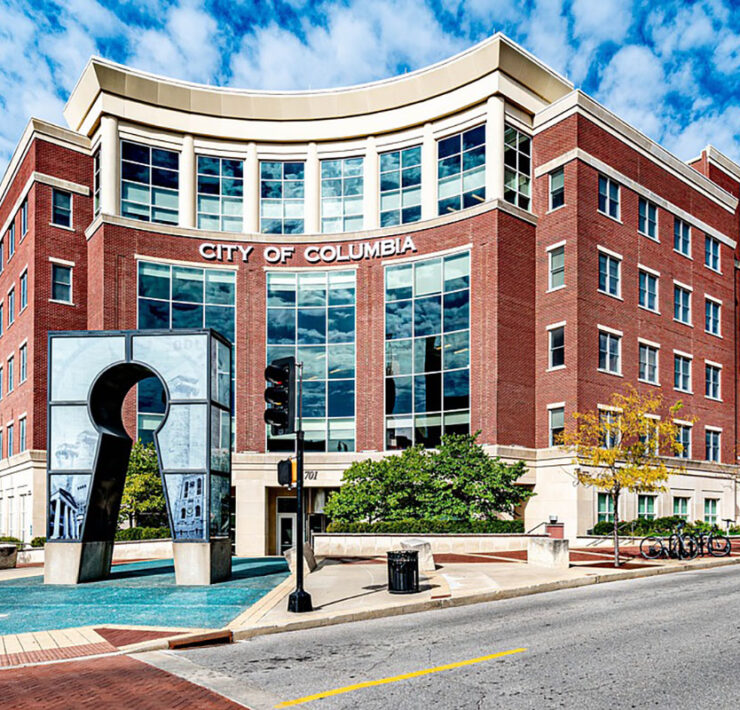Nowhere to Go But Up

Boone County’s Mobility Action Plan aims to solve the root causes of disparity keeping some residents from flourishing.
The story of how the Upward Mobility Initiative came to Boone County involves a letter of intent, a grant application, and the selection by the Urban Institute as one of only eight cohort communities in the country — and the only rural one — to receive $125,000.
This might seem like another typical project. Those in government, business and civic organizations, and various nonprofits garner grant funding intended to improve life in Boone County. While it may have started out that way, the Upward Mobility Initiative is different. It’s driven by the community. It’s driven by results-based accountability. And it’s designed to create systemic change.
What Is Upward Mobility?
The premise of creating opportunities for upward mobility in communities is simple, and it leads off the Boone County Mobility Action Plan Community Report:
“Upward Mobility is the idea that everyone deserves the chance to improve their lives, to strengthen their economic well-being, to be valued and feel they belong, and to have power and autonomy.”
The Numbers Tell the Story
Boone County residents enjoy a good quality of life. People own homes, businesses thrive, unemployment is low, employers provide access to benefits, and educational attainment is above the norm. But when you break down the data according to race, ethnicity, and socioeconomic status, something else comes to light.
As written in the report: “Families of color, specifically Black families, disproportionately experience higher poverty rates, poorer school outcomes, more referrals to juvenile justice, and poorer health outcomes. These disparities mean, if you are a person of color within the county, you are at a severe disadvantage for economic mobility. Those in poverty, within the county, are impacted by limited upward mobility across generations.”
Three initial areas of focus materialized from the data: Early grade literacy; fair and inclusive housing; and jobs and workforce development. Joanne Nelson, director of Boone County Community Services, looked to Cradle to Career Alliance to help identify individuals willing to facilitate workgroups to tackle each issue. They needed people who had the life experience and leadership skills to lead these efforts.
It’s Personal
Alvin Plummer and Alvin Cobbins, both members of the Men’s Minority Network, and Brittany Hughes, a political and religious organizer, answered the call. These stakeholder facilitators convened people affected by their respective issues, neighborhood and community leaders, stakeholders, and elected officials to dive into the numbers, elucidate problems, and develop strategies for long-term solutions.
Solving systemic problems in these areas is personal to each of these facilitators. From the outside, looking in, it’s also personal to Janet Thompson, Boone County District II commissioner. She moved to Columbia at 2 years old, shortly before Eliot and Muriel Battle moved their family here.
“I went to school with the Battle kids. The Battles are now considered to be icons in our community, but not so long ago Muriel and Eliot Battle couldn’t buy the house they wanted just because they were Black.”
The field, Janet says, has been far too unlevel for far too long.
Early Grade Literacy
Alvin Plummer’s workgroup looked at the data and found that access, equity, and poverty keep some youth from achieving literacy in Boone County. The workgroup hopes the outcome of efforts in this area mean that all children learn to read and view themselves as readers and writers. To get there, early childhood experiences across the board need to improve, as do wraparound services for children that address not just educational needs, but emotional, behavioral, physical, and mental needs as well.
“Although all three focus areas of the Upward Mobility Initiative are crucial, Early Grade Literacy may be one of the most difficult to get our arms around,” Alvin says. “I say this because there are so many nuances that impact desired solutions.”
“From my perspective, the desire to include a broad cross-section of organizations and people that are on the front lines where real change can be effectuated is most encouraging,” Alvin says. “While our committee is currently small in number, there is a deep concern for improving early grade literacy and a sincere desire to implement the changes necessary to make much-needed improvements.”
Fair and Inclusive Housing
Increasing the amount of affordable housing available, creating an adopt-a-block home maintenance program, and fostering second-chance leasing opportunities for residents whose history might block them from quality housing are key strategies.
“I think the most hopeful thing was seeing how many folks from across the county we were able to get to sit around the table with us at each meeting,” Brittany says. “All of the folks who showed up for our work sessions had different experiences around housing, and some had been more impacted by the current system than others. But everyone had the same clarity around why we were in the room. All Boone County residents deserve safe and affordable housing, point, blank, period. It’s amazing what we can do when we’re all clear about our ‘why,’” she says.
Jobs and Workforce Development
Racism was identified as a deep-root cause for why not everyone is Boone County can live, learn, grow, flourish, and prosper equally. Alvin Cobbins’ workgroup wants to focus on increasing social capital usually missing among those with a lower socio-economic status. These stakeholders want employers to take more responsibility for providing fair, living-wage employment opportunities. And for those seeking to escape poverty and earn a living through entrepreneurship, their efforts should be supported.
Workgroup strategies include programs providing leadership opportunities for Boone County youth and pathways to education and training beyond high school. They also include supporting those with criminal records seeking employment and adopting Ban the Box.
“This issue is about careers versus jobs,” Alvin says. “Those who come out after being incarcerated get the jobs that are at the bottom of the barrel. We need employers willing to invest in people who want to be stable and positive employees.
“My workgroup embraced this. They are the most dedicated, creative, and honest people who keep coming back to work on solving these problems.”
Beginning With the End
Results-based accountability begins with looking at key indicators for the entire population. What it takes to effect long-term change is “Turn the Curve Thinking” at the program level.
“If you’re just looking at the big picture, it’s going to be hard to move the needle on these issues,” Joanne says. “Let’s not put a Band-Aid on there. Let’s look at why people are having trouble and look at the programs affecting them.”
Navigating the curve may require backing up a few times. As Alvin Plummer says of his workgroup, “We have articulated an action plan, but we must return to step three to identify more partners who have a role to play in ‘turning the curve.’ Once more partners are identified, we will be in a better position to implement the action plan.”
“This method provides a different way of looking at data,” says Alvin Cobbins. “Everybody looks at it but sees it through different lenses. The gaps in the data are obvious, but we’re looking at the populations below that gap. To do that, we need to have everyone at the table who should be, listen to other people’s ideas, share ideas, and let everyone have a voice.”
What the workgroups have produced to date are just the beginning. Although the Community Services Department will take the lead in implementing the “Action Plan,” everyone who’s been involved and others who should be will continue the work. That long-term commitment and deep community buy-in sets this effort apart.
“I think this effort is different in that the analysis, solutions, and strategies for how to accomplish our goals were community driven. I believe that if things in our world are going to change and change for the benefit of all of us, then it has to start at the grassroots level,” she says. “I can’t make promises about the future, but my hope is that because this effort was rooted in that philosophy that somewhere down the line, we’ll see the fruits of our labor.”
Janet agrees there are no quick fixes when addressing systemic problems.
“This will live much longer than Janet Thompson or anyone working on this initiative. This will go on and on,” she says. “We have to do it better, not for us, but for the next generation. We have an obligation to our community to see that happens.”
Boone County Department of Community Services
605 E. Walnut Street, Suite A
573-886-4298








